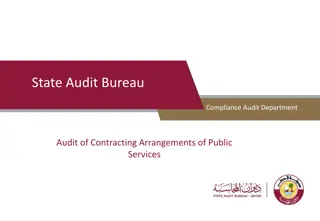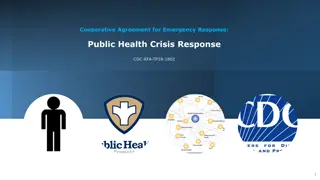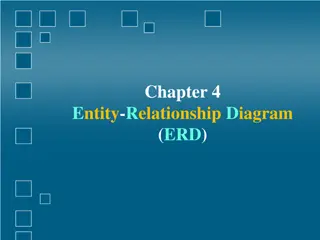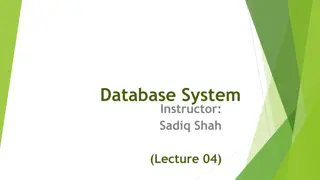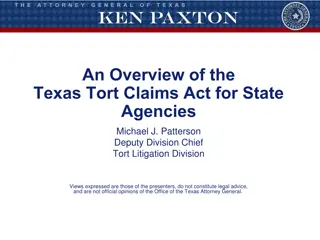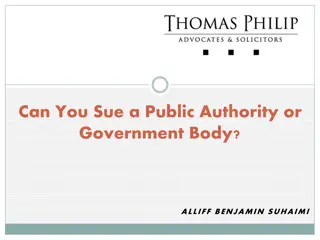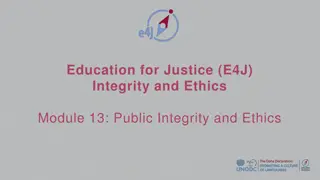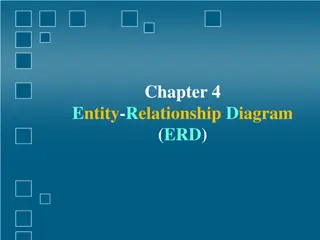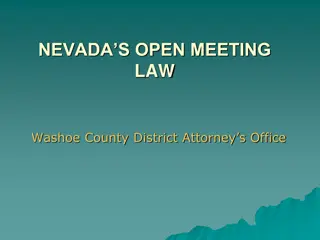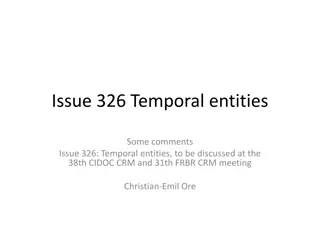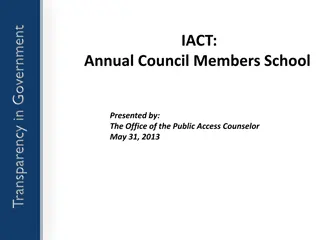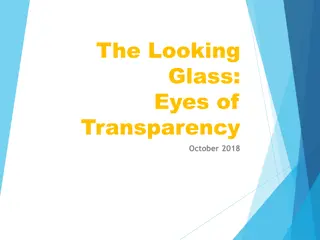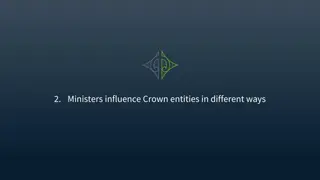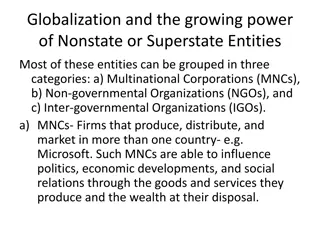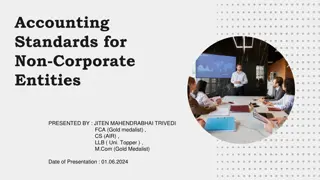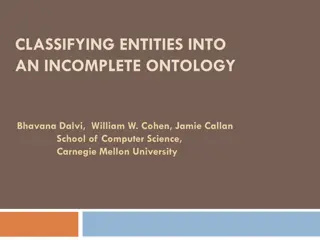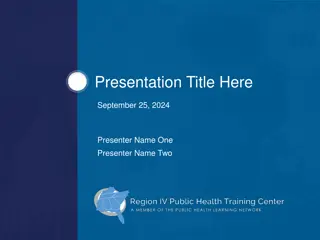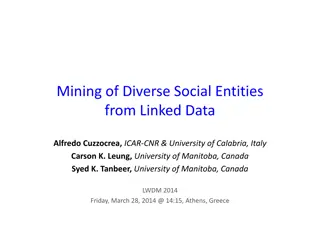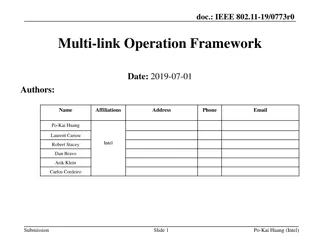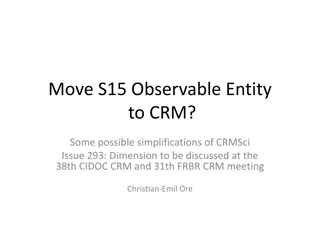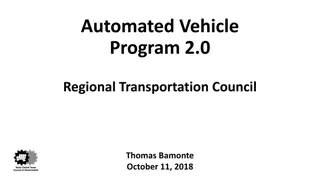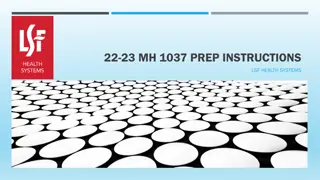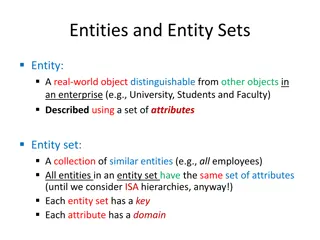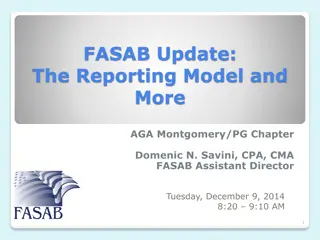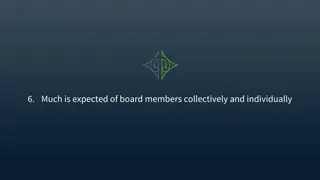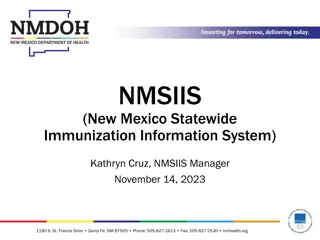Overview of Healthcare and Life Science Market in Saudi Arabia
Saudi Arabia's healthcare and life sciences sectors are a priority, with significant investments and opportunities for firms in medical equipment, pharmaceuticals, and more. The Department for International Trade aims to support UK entities in seizing trade opportunities and fostering a culture of e
1 views • 10 slides
NOT-FOR- PROFIT MAKING CONCERN
Not-for-profit organizations, such as educational institutions, public hospitals, and charitable trusts, operate with the main objective of providing services rather than making profits. These organizations rely on various sources of funding like contributions, donations, and grants. Accounting for
4 views • 4 slides
Importance of Public Sector Auditing in Enhancing Accountability and Governance
The Auditor-General of South Africa plays a critical role in strengthening democracy through auditing public sector institutions. Public sector auditing ensures compliance, performance evaluation, and governance transparency, ultimately building public confidence. Key stakeholders include government
1 views • 11 slides
CCPHIT Workforce Development Program in California
The CCPHIT Workforce Development Program in California, supported by ONC under grant number 90PH0006/01-05, aims to develop public health informatics and technology curricula to meet the informatics needs of public health employers. Led by Dr. Kamiar Alaei and Gora Datta, the program focuses on crea
0 views • 15 slides
Promoting Private Sector Engagement in Local Governance through PPPs in Zambia
This presentation outlines the promotion of private sector engagement in local governance in Zambia through Public-Private Partnerships (PPPs). It covers the legal and institutional frameworks, processes, sub-national level PPP projects, current initiatives, lessons learned, and conclusions. The ove
2 views • 23 slides
The Role of DevOps Certifications in Government and Public Sector Projects
Incorporating DevOps methodologies into government and public sector projects can lead to substantial improvements in efficiency, collaboration, and service delivery. DevOps certifications are instrumental in achieving these benefits, providing teams with the skills and knowledge necessary to excel.
3 views • 8 slides
India Alliance Clinical & Public Health fellowship in India
India Alliance Clinical & Public Health fellowship in India\n\nIndia Alliance Clinical and Public Health Research Fellowships are for Health researchers with an MD, MS, MPH, or an equivalent clinical or public health degree, who can apply for the DBT\/Wellcome Trust India Alliance Clinical and Publi
0 views • 5 slides
Sanctions Licensing Processes at OFAC Overview
The Office of Foreign Assets Control (OFAC) administers U.S. economic sanctions against targeted foreign entities. This overview covers OFAC's jurisdiction, licensing authorities, application processes, and tips for interacting with OFAC. Compliance with U.S. primary sanctions is crucial, especially
0 views • 32 slides
Vehicle & Asset Management: Surplus Property Distribution to Local Entities
The Surplus Property Program, operated by General Services, manages the redistribution of surplus property purchased with state funding to various entities such as state agencies, local governments, and non-profit organizations. Additionally, the Federal Excess/Surplus Property Program oversees the
0 views • 16 slides
Introduction to Public Key Cryptography
Public key cryptography, exemplified by algorithms like Diffie-Hellman and RSA, revolutionizes secure communication by allowing users to encrypt messages with public keys known to all and decrypt them with private keys known only to the intended recipient. This advanced encryption method ensures sec
1 views • 44 slides
Comparative Analysis of Municipal Services in Public Sector Evolution
Explore the evolution and role of public services in the municipal sector through a comparative analysis presented in a block seminar by Prof. István Hoffman. Delve into the general theory of public services, the traditional and changing approaches of public administration, and government expenditu
0 views • 74 slides
Comprehensive Overview of Corruption Watch Submission on Public Procurement Bill [B18B-2023]
Corruption Watch, a civil society organization, presents a detailed submission on the Public Procurement Bill [B18B-2023], highlighting key areas such as legislative reform, public participation, preferential procurement, transparency measures, independence of procurement entities, anti-corruption m
0 views • 16 slides
State Audit Bureau in Qatar: Ensuring Accountability and Transparency
The State Audit Bureau in Qatar, established in 1973, plays a crucial role in safeguarding public funds, ensuring compliance with laws, and enhancing transparency. Through its audit of contracting arrangements in the public sector, the Bureau aims to improve resource utilization for sustainable deve
0 views • 18 slides
Enhancing Public Health Workforce for COVID-19 Response Grant Program
This cooperative agreement aims to strengthen public health departments by expanding staff, hiring school nurses, and developing public health leaders. It includes major goals like creating a Public Health AmeriCorps and modernizing the public health workforce. The grant terms specify funding distri
1 views • 17 slides
Understanding Entity-Relationship Diagrams (ERD) for Database Design
Entity-Relationship Diagrams (ERD) are vital in database design, illustrating entities and their relationships. They help in conceptualizing data models and laying the groundwork for database structures. The process involves identifying entities, defining relationships, and analyzing interactions to
0 views • 40 slides
Understanding Modeling Entities and Attributes in Database Systems
Entities, relationships, and attributes are fundamental constructs in the Entity-Relationship (E-R) model. Entities represent people, places, objects, events, or concepts in a user environment. Each entity type has a set of attributes defining its properties. It is crucial to distinguish between ent
2 views • 17 slides
Understanding the Texas Tort Claims Act for State Agencies
The Texas Tort Claims Act (TTCA) outlines the scope of tort liability for State entities and employees during their state employment. State entities are represented by the Office of the Attorney General, and specific provisions apply to state entities separate from municipalities. This overview cove
0 views • 16 slides
Understanding Judicial Review in Suing Public Authorities
Judicial review is the inherent right of courts to review decision-making processes of public bodies. It allows for challenging and analyzing decisions, granting public law remedies like declaration, certiorari, mandamus, prohibition, and quo warranto. Those adversely affected by public duty actions
0 views • 13 slides
Exploring Public Integrity and Ethics in Civil Service
This module on public integrity and ethics delves into key instruments for strengthening ethical practices in public organizations, challenges faced, analyzing codes of ethics, and managing integrity risks. The agenda includes activities like structured ethical reflection, understanding public value
1 views • 13 slides
Understanding Entity-Relationship Diagrams (ERD)
An Entity-Relationship Diagram (ERD) is a vital data modeling technique for visualizing an information system's entities and their relationships. This graphical representation helps in database design by defining entities, analyzing interactions, and determining cardinality. Entities represent real-
1 views • 40 slides
Understanding Nevada's Open Meeting Law (OML) in Washoe County
Nevada's Open Meeting Law (OML) ensures that the deliberations and actions of public bodies are conducted openly in order to aid in the conduct of the people's business. The law applies to all meetings where deliberation or action may occur. Public bodies covered by OML include boards, commissions,
0 views • 27 slides
Discussion on Temporal Entities and Simultaneity in CIDOC CRM Meeting
Temporal entities and the modeling of simultaneity in CIDOC CRM are under discussion at the upcoming meeting. The current approach considers the cardinality of certain relations, aiming to streamline the representation of time-spans and spacetime volumes. The evolving perspectives on the spatial com
3 views • 5 slides
Effective Contract Management and Procurement Practices
The Public Procurement Act of 2063 lays down guidelines for procurement by public entities, emphasizing preparation of specifications, cost estimates, and selection methods. Entities must follow prescribed methods for goods, services, and consultancy, ensuring fair competition and transparency in th
0 views • 85 slides
Understanding Indiana's Open Door Law: Public Access and Governance
The Indiana Open Door Law ensures transparency in public agency actions by requiring open meetings unless exempted. The Public Access Counselor provides guidance on public access laws, emphasizing the importance of public information accessibility. Meetings under the law must be open to the public,
0 views • 17 slides
Understanding Public Goods in Higher Education
This text delves into the concept of public goods in higher education, examining the distinctions between public and private forms, the economic and political dimensions, and the normative value of public goods. It discusses the economic definition of public goods, emphasizing their non-rivalrous an
1 views • 18 slides
Ensuring Transparency in Public Governance: The Brown Act and Public Records Act
This content emphasizes the importance of transparency in public governance by discussing key laws such as the Brown Act and Public Records Act. It highlights the necessity for public officials to conduct business transparently, allowing the public to monitor and participate in decision-making proce
0 views • 22 slides
Ministers' Influence on Crown Entities through Strategic Processes
Ministers influence Crown entities by appointing effective boards, engaging in dialogue, participating in strategic planning, and ensuring continuous improvement. They make appointments, hold meetings, receive regular performance reports, and guide entities in setting strategic directions. Through f
0 views • 11 slides
Globalization and the Influence of Nonstate Entities
Globalization is shaped by the power of Multinational Corporations (MNCs), Non-governmental Organizations (NGOs), Inter-governmental Organizations (IGOs), and technological advancements. These entities wield influence on politics, economics, and social dynamics globally. The authority and legitimacy
0 views • 4 slides
Accounting Standards for Non-Corporate Entities Overview
Introduction to accounting standards for non-corporate entities such as partnerships, LLPs, trusts, and nonprofits. Explanation of the applicability of accounting standards based on business size and the classification of Level I, II, III, and IV entities by ICAI. Details of the ICAI announcement da
0 views • 14 slides
Classifying Entities into an Incomplete Ontology: Exploratory EM Approach
The research discusses methods for hierarchical classification of entities into incomplete ontologies. It explores the challenges of evolving web-scale datasets and the need for classifying entities in an incomplete ontology structure. The Hierarchical Exploratory EM model is detailed, providing ins
0 views • 27 slides
Region IV Public Health Training Center Overview
The Region IV Public Health Training Center (PHTC) is dedicated to strengthening the competence of the public health workforce in HHS Region IV. It provides professional development opportunities for both current and future public health professionals through training programs, field placements, and
0 views • 33 slides
Diverse Social Entities Mining from Linked Data in Social Networks
This research focuses on mining diverse social entities from linked data in social networks using a DF-tree structure and DF-growth mining algorithm. The study explores the extraction of important linked data in social networks and the mining of various social entities such as friends. Prominence va
0 views • 13 slides
IEEE 802.11-19/0773r0 Multi-link Operation Framework Summary
The document discusses the multi-link operation framework for IEEE 802.11-19/0773r0, focusing on load balancing and aggregation use cases. It introduces terminology related to multi-link logical entities and provides examples of multi-link AP and non-AP logical entities. The framework considers stee
0 views • 16 slides
Comparison of Observable Entities in CRM and CRMSci
In this content, different aspects of observable entities in CRM and CRMSci are discussed, including measurements, assignments, simplifications, and adjustments. The evolution and implications of observable entities within these frameworks are explored through various dimensions and properties, shed
0 views • 7 slides
Regional Automated Vehicle Program 2.0 Overview
Regional Automated Vehicle Program 2.0, led by the North Texas Regional Transportation Council, aims to facilitate the deployment of automated vehicles (AVs) in public entities. The program consists of various projects such as AV planning, cost coverage, and fund allocations for priority deployments
0 views • 10 slides
Requirements for Managing Entities in Health Systems
Grant agreements and payments of federal and state financial assistance require compliance with specific statutory authorities. Managing entities must follow guidelines for reporting and reconciling funds, with a focus on transparency and accountability. Providers are required to complete specific s
0 views • 15 slides
Understanding Entities and Relationships in Database Design
Explore the concepts of entities, entity sets, attributes, key attributes, single-valued and multi-valued attributes, derived attributes, as well as relationships and relationship sets in the context of database design. Gain insights into distinguishing between regular entities, weak entities, and e
0 views • 24 slides
FASAB Update: The Federal Reporting Entity Proposal
Discussions on the Federal Accounting Standards Advisory Board (FASAB) update regarding the reporting model, including proposals for the General Purpose Federal Financial Reports (GPFFR) and the distinction between consolidation entities and disclosure entities. The presentation covers principles of
0 views • 31 slides
Expectations and Responsibilities of Board Members in Statutory Entities
Board members of statutory entities are collectively expected to ensure consistent and effective entity performance, financial responsibility, and collaboration. Individually, they must act with integrity, comply with legislation, and avoid conflicts of interest. Boards have a crucial role in monito
0 views • 5 slides
Overview of NMSIIS: New Mexico Statewide Immunization Information System
NMSIIS is a comprehensive immunization system in New Mexico managed by Kathryn Cruz. It houses millions of patient records and vaccines, serving over 1500 providers and 24k active users. The system offers centralized records, inventory management, reporting, outbreak response, and reminder/recall fu
0 views • 19 slides




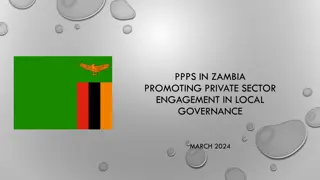
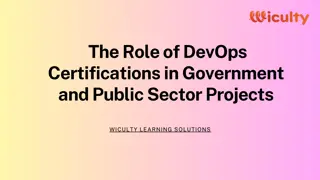

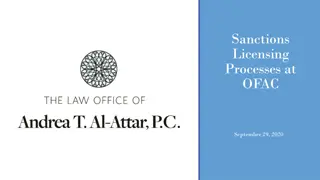
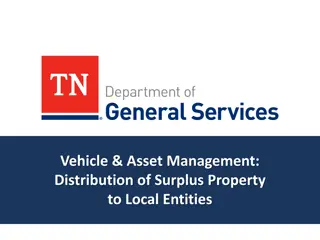
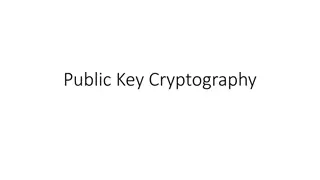
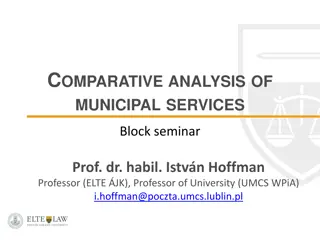
![Comprehensive Overview of Corruption Watch Submission on Public Procurement Bill [B18B-2023]](/thumb/138344/comprehensive-overview-of-corruption-watch-submission-on-public-procurement-bill-b18b-2023.jpg)
